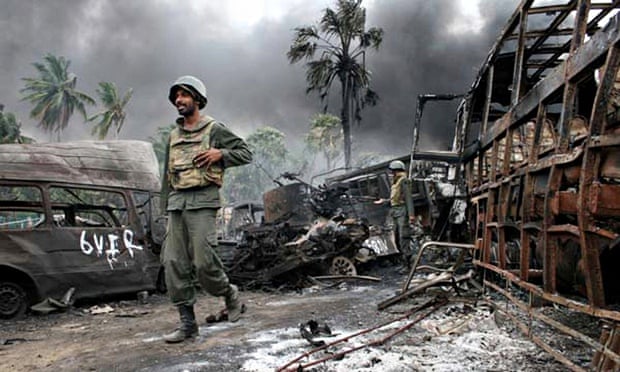An account of the civil war in Sri Lanka and its aftermath is all the more devastating for withholding judgment

“It is equal to living in a tragic land/ To live in a tragic time,” said Wallace Stevens in the poem “Dry Loaf”. It is about an attempt to portray a bucolic scene – “That was what I painted behind the loaf,/ The rocks not even touched by the snow” – while the exercise is transformed at every moment by the incursion of history: “It was the soldiers went marching over the rocks/ And still the birds came, came in watery flocks,/ Because it was spring and the birds had to come.”
In Samanth Subramanian’s excellent account of the civil war and its aftermath in Sri Lanka, history encompasses the people who lived through that “tragic time”, and the land’s sole function is to serve as that history’s paradigm. There’s no getting away, whether you find yourself in Canada or in a time of peace.
Subramanian is an Indian of Tamil ethnicity. Today’s regrettable recuperation of caste origins in India in the name of genealogy would remind us that he’s a Tamil Brahmin or, in the kitsch-sentimental language of the new Indian elite, which both fetishises and constantly invents pedigree, a “Tam-Brahm”. The Tam-Brahm, progeny of a priestly class, is putatively a secular whizz-kid and achiever, although the upper-caste inflection is never entirely renounced. And, indeed, Tamils have shone in modern India: to take just one instance, India’s remarkable space programme is powered by Tamil scientists.
More
In Samanth Subramanian’s excellent account of the civil war and its aftermath in Sri Lanka, history encompasses the people who lived through that “tragic time”, and the land’s sole function is to serve as that history’s paradigm. There’s no getting away, whether you find yourself in Canada or in a time of peace.
Subramanian is an Indian of Tamil ethnicity. Today’s regrettable recuperation of caste origins in India in the name of genealogy would remind us that he’s a Tamil Brahmin or, in the kitsch-sentimental language of the new Indian elite, which both fetishises and constantly invents pedigree, a “Tam-Brahm”. The Tam-Brahm, progeny of a priestly class, is putatively a secular whizz-kid and achiever, although the upper-caste inflection is never entirely renounced. And, indeed, Tamils have shone in modern India: to take just one instance, India’s remarkable space programme is powered by Tamil scientists.
More
No comments:
Post a Comment